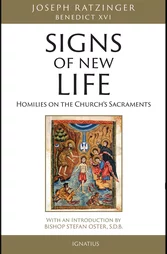When it comes to the sacraments, perhaps the most identifiably Catholic one after the Eucharist is the sacrament of Penance and Reconciliation. Even if you don’t know exactly how to make a good confession, you know the visual cues and the general idea of it. How many movies and television shows have made use of the imagery of a confessional and its grate for dramatic purposes? Nothing shows the guilt and heightens the psychological drama of a story like having a protagonist in a dark room illuminated by the flickering light of a candle, tearfully whispering his or her sins to the figure unseen on the other side of the metal screen.
The sacrament of Penance is dramatic, though in reality the true drama is far more difficult to convey: It is the drama of a son or daughter who was lost and now is found, and the unseen rejoicing of the saints and angel choirs at the mercy being poured out on us sinners. It is the drama of a soul who has once again been embraced by a loving Father.
That grace of mercy is a grace all of us need, but sometimes the structure of the sacrament can seem intimidating, especially if it has been a while since you have partaken of it. Whether it has been one week or sixty years since you last received the sacrament of Penance, you can always receive the sacrament, no matter what you have done.
The following questions will serve as a guide for approaching the sacrament of Penance and Reconciliation and receiving numerous graces Christ offers to us through it.
- What is the sacrament of Penance, and why should I go?
- What do I confess?
- How do I know what I need to confess?
- What do I do to receive the sacrament?
- Where can I learn more?
What is the sacrament of Penance and why should I go?
The sacrament of Penance and Reconciliation, also called the sacrament of Conversion (CCC 1423), is the sacrament whereby we return to God after we have turned away from him by our sins. When we sin, we stand in need of God’s forgiveness—we need to be reconciled with him by his love (CCC 1424). While the sacrament of Baptism cleanses us of the stain of original sin (and any personal sins committed prior to receiving it), it has not
abolished the frailty and weakness of human nature, nor the inclination to sin that tradition calls concupiscence, which remains in the baptized such that with the help of the grace of Christ they may prove themselves in the struggle of Christian life. This is the struggle of conversion directed toward holiness and eternal life to which the Lord never ceases to call us. (CCC 1426)
This inclination to sin often leads us to commit sins, frequently venial and sometimes mortal in nature. When we commit mortal sins, we break off our friendship with God by refusing to do his will and instead do what we want. When we commit venial sins, we wound that friendship with God in small ways that, in turn, disposes us towards committing mortal sins. The sacrament of Penance provides us an opportunity to convert, “to turn” (Latin, convertere), from our sins back to God, and through his love to rebuild that friendship with him. Sin wounds our souls, and the sacrament of Penance provides the healing we so desperately need.
The Church seeks to teach us the importance of this sacrament when she requires that “after having attained the age of discretion, each of the faithful is bound by an obligation faithfully to confess serious sins at least once a year,” and requiring anyone who is aware of committing a mortal sin to refrain from receiving Communion until they have confessed that sin (CCC 1457).
But this is what might be called “the bare minimum” approach, and we should all want to do more than the bare minimum, out of love for our God who loves us beyond measure. Catholics must confess at least once a year, and if you want to receive Communion, you must confess any mortal sins before you do, but even if you have not committed a mortal sin, it is recommended to receive the sacrament at least once a month. There are a few reasons for this.
Frequenting the sacrament of Penance helps us to better strive to overcome sins that we are working on. For example, if I am really struggling to pay attention during Mass, which is likely not a mortal sin, I might make a point of working on that virtue by confessing distraction each month, so that I maintain awareness of the venial sin while making an effort to fight against that sin by cultivating the virtue of attentiveness and reverence during Mass.
Furthermore, going to the sacrament of Penance at least monthly helps us to avoid the “I guess I’m a good person” problem when we get into the confessional. What I mean by that is that most of us hopefully do not have to frequently confess murder. If I were to have to confess that, it would be a hard one to forget. But when the sins are slightly less dramatic, it can be hard for any of us to recall our sins. Did I lie in the last six months? Possibly, but I couldn’t be specific about it. I could guess I’ve been impatient with my children. I likely have said a curse word. However, I know I have been in line for confession and even failed to come up with that many sins. I know myself well enough to know I sin and am not yet a saint, but I don’t necessarily recall my sins with specificity if it has been longer than a month since I went to confession.
Moreover, confession is not only about the sins committed, but also about the failure to respond to the promptings of the Holy Spirit. Did I respond to grace? Did I set down my book to mirror God’s love to my child? Did I take a breath to speak in a comforting voice? Did I respond to the promptings of the Holy Spirit to pray? Did I take an opportunity to make a small sacrifice—taking a smaller piece of cake than I wanted? These sound like small things, but as St. Therese encourages us to remember, “I can prove my love … by never letting slip a single little sacrifice, a single glance, a single word; by making profit of the very smallest action, by doing them all for love.”1
Frequenting the sacrament of Penance can help us grow in love by helping us to recall the little failings and rallying us to fight against them. We grow deeper in love of God and more firmly strengthen our relationship with him by going beyond the bare minimum when we examine our soul frequently and honestly.
What do I confess?
When you approach the sacrament of Penance, we must confess all mortal sins of which we are aware, and we ought to confess any venial sins we might have committed. This distinction can be confusing, so I recommend reading further on the topic of moral and venial sin here.
What is worth reiterating is that the Church has two broad ways of describing sin: A sin can be mortal or a sin can be venial.
1. Mortal sins
These break off our relationship with God. When you sin mortally, it is as if we have turned away from God’s path and gone off in a completely different direction.
2. Venial sins
These harm our relationship with God without fully breaking it. When we sin venially, it is as if we are still on the same path, but we are taking a byway, or we are wasting time at a gas station, or maybe we are just going a little off on our own. This might not sound too bad, but the net effect of lots of detours, time wasted, and small deviations can lead to mortal sin, where eventually we do find ourselves in the state of mortal sin and going a completely different direction than the way God has told us to go.
When it comes to determining whether any particular sin is mortal or venial, the Church gives us the following guidelines. A sin is mortal if:
- It’s object is grave matter, or a serious offense against God’s laws. This is generally those sins outlined by the 10 Commandments (CCC 1857).
- The sin must be committed with full knowledge. This means, for example, a child under the age of reason who walks off with a toy from the store in his hands, but does not have a grasp of the concept of stealing yet, is not guilty of a mortal sin, because he did not have full knowledge that his action is a sin yet (CCC 1859).
- The sin must be completed with complete consent. That means, for example, someone whose spouse has sterilized themselves against the wishes and expressed desires of the first individual, who knows and understands that action to be grave matter, is not culpable of a mortal sin because the mutilation was undertaken without the consent of the first spouse (CCC 1859).
If a sin meets all three of these determinations, it is a mortal sin. If we sin in this way, we must refrain from partaking of the Eucharist until we have received the sacrament of Penance to restore our friendship with God. Nevertheless, we should continue to attend Mass even without receiving the Eucharist in order that we may receive the graces of Mass to help us restore that friendship. Moreover, if we are unsure if a sin is mortal, we can still refrain from Communion, instead opting for an act of spiritual Communion until we have had time to meet with a priest and receive Absolution.
Venial sins do not have to be confessed to be in a state of grace, but it is generally recommended by all the great saints that we make a habit of confessing those sins. St. Josemaria Escriva had this to say about venial sins in his excellent book of practical spiritual advice, Furrow:
The irresponsibility of so many men and women who make no effort to avoid deliberate venial sins, pains Our Lord very much. It’s normal, they think, and seek to excuse themselves. … Listen carefully: most of that mob, which condemned Christ and put him to death, also began only by shouting—just like the others—by going to the Garden of Olives—with the rest of them … In the end, still carried along by what “everyone” was doing they did not know how to draw back or did not want to … and they crucified Jesus! Now, after twenty centuries, we still have not learned.2
It is good practice to root out even those small sins from our lives, and we can do this best by frequently being aware of the sins we are committing, and then naming them explicitly in confession. As Jana Bennett and David Cloutier remind us, “naming sin is meant to be empowering—empowering in that we take real responsibility for the past and we can participate in the process of doing better in the future.”3
How do I know what I need to confess?
One of the hardest parts when it comes to receiving the sacrament of Penance is knowing what we need to confess. St. Josemaria’s words always strike me deeply, but it can be so hard in line for confession, even if it is only the last month or week I am looking over, to remember what I actually have done. This is where the practice of making a regular examen can help us all make a better confession.
An examen, or an examination of conscience, is, as the Catechism teaches, “prayerful self-reflection on our words and deeds in light of the Gospel, to determine how we may have sinned against God” (CCC 898).
There are two kinds of examens that are frequently advised, especially by those priests who offer us guides for making progress in the spiritual life: the general daily examen and the particular daily examen.4
General daily examen
When it comes to the general daily examen, it can be approached in mental prayer, though I have also found, especially if I am trying to overcome a particular sin, that writing it down in a journal can be helpful, as well.
There are five steps to the general daily examen. Doing all five takes about fifteen minutes. It is generally recommended that it be made at night before going to sleep.
1. Thank God for all the graces he has given us, spiritual and temporal, since our last examination of conscience.
Gratitude positions us with the proper attitude when approaching God and doing an exercise of this sort.
2. Ask the Holy Spirit for the grace to know our sins and to struggle to get rid of our sins.
This last part is very important because it is only with grace that you can “look at yourself in the mirror to know where you have hurt yourself or where the blemishes are, so that you can get rid of them.”5
3. Review your day, hour by hour, since walking up until the time you sat down to make your examination.
This may sound tedious, but you must take courage to fight the sin in your life, and that first means taking the time to look at yourself honestly. In doing this review, you might first examine your thoughts, then your words, and then your actions both in the outward ways that you have sinned and in the inward ways which block your ability to love God more. (If some other process of review works better for you, feel free to use that approach.)
4. Ask God’s pardon for those sins in your own heart.
You will still take them to the sacrament of Penance, but to help you overcome them, we should express our sorrow in an act of contrition each day for the ways we have failed to love him and our neighbor.
5. Resolve to amend your life, with the help of God’s grace through the power of the Holy Spirit.
One part of this resolution that I find very helpful is to consider my sins and what difficulties I might encounter the next day as I try to avoid them. For example, if I was impatient with my children because I was overly tired, can I go to bed earlier so that I am less fatigued and have more patience tomorrow? At this time, I can also ask God for help in enlightening me how best to avoid sins.
Particular daily examen
Another helpful practice when it comes to knowing what to confess when receiving the sacrament of Penance is the particular daily examens of conscience. I especially like the advice that this examen not simply be about correcting our faults, but it can be used to help us acquire or better practice virtues we are working on, as well. The steps for the particular daily examen are as follows:
1. In the morning, immediately once you wake up, resolve to guard yourself all day against a particular sin or fault.
Or to attend in particular to the opportunities to practice a particular virtue.
2. At lunch time, ask Our Lord for the grace to see where you have fallen into the sin so far, or the grace to see the opportunities you have had to practice the virtue.
Then ask for grace to correct your sin and make amends, or ask for the grace to be aware of upcoming opportunities to practice the virtue. Thank God for the grace you have had so far in practicing it.
3. After dinner or before bed, make a second examen about this sin in particular (or the practice of this virtue) following the method for the general daily examen.
The advantage of doing all this through journaling is that when you prepare for the sacrament of Penance, you can review your entries and find plenty of things to confess. But even just practicing the examens mentally can help to keep at the forefront of our minds the ways in which we have failed at loving God or are seeking the opportunity to love him more, which helps in preparing well to receive the sacrament of healing.
What do I do when I go to confession?
When you approach the sacrament of Penance, whether you are going into your church or grabbing a priest in the parking lot, take a moment to recollect yourself and ask the Holy Spirit to enlighten you to the sins you have committed since your last confession, especially any mortal sins. Then ask for the grace to truly be sorry for your sins—to have contrition. This does not always mean you have a “feeling”of sorrow, though at times we will, and that can actually be a grace. Contrition means we at least want to distance ourselves from our sins, even if there are parts of those sins that we like.
For example, I like scrolling on my phone. I know this can be a venial sin if I’m using it to avoid the responsibilities of my vocations as a wife and mother. But I do like it; I enjoy the dopamine high. So I can approach confession with a desire to distance myself from this, to be sorry that I am failing in this way in the work God has given me, and part of that can be owning up to why I am doing that sin, including that I like it, and that I am using this pleasure in a way that does not make God happy.
Sometimes, I do feel more shame at these failings, but sometimes I don’t have the time to sit there and really ponder the ways in which I have failed God with hours of focused attention to have this deep shame and sorrow (which can be really healthy and good things in the spiritual life), and that is fine. At confession, what we need to bring is that sorrow that we have sinned against God and the intention and desire to not sin again—even if not sinning again in that way may seem difficult.
When you are actually at the confessional, you can choose to make your confession either behind a screen or face to face. Either way, the priest is here in persona Christi, “in the person of Christ.” So be honest, be specific, and be courageous so that God can offer you healing. The confessional is not spiritual direction
What does the priest need to know?
A few things:
- How long it has been since your last confession?
- What sin you have committed?
- is there any relevant information that would be necessary to understanding the sin (for instance, if you have an addiction to a particular sin, it could influence the gravity of that sin; or if you are married and you use contraception during sexual relations versus using contraception in premarital relations)?
- How many times you have sinned (and this can be more general, such as, “At least once a day I have spoken in anger about the cars merging onto the freeway,” to more specific: “I have stolen from work three times in the last month”)?
A confessor does not need every explicit detail of a sin, extenuating information beyond your sinful actions, or your current spiritual questions in order to absolve you; though you may benefit from spiritual direction for the last of those, and priest might be able to provide you with that in a different context.
Once you have named and numbered your sins, the priest might have a few pieces of advice or spiritual practices to suggest to help you avoid falling into sin in the future. Then he will often give you a penance to help you make satisfaction for your sin. The Catechism teaches that
The penance the confessor imposes must take into account the penitent’s personal situation and must seek his spiritual good. It must correspond as far as possible with the gravity and nature of the sins committed. It can consist of prayer, an offering, works of mercy, service of neighbor, voluntary self-denial, sacrifices, and above all the patient acceptance of the cross we must bear. Such penances help configure us to Christ, who alone expiated our sins once for all. (CCC 1460)
So while Absolution takes away our sins, Penance helps to restore our spiritual health and strengthen us in our spiritual life. It is always advisable to do your Penance as soon as possible after receiving absolution.
And a note about penances: You can always ask a priest to provide you with a different penance, or a more reasonable one, either during that confession or, supposing you were unable to complete a penance or a priest gave you a penance like “read a Psalm every day” with no end point, at your next confession—even if it is with a different priest.
The priest will then prompt you to make your act of contrition. This is a short prayer expressing your sorrow for your sins and your intent to not sin. There are a few versions, but one short one suggested by the USCCB is: “Lord Jesus, Son of God, have mercy on me, a sinner.”
Then the priest will absolve you, and you are free to leave and make your penance and go and sin no more.
Confession can seem intimidating, but the grace and healing our Lord offers us in this sacrament is a balm to any fears we may have. So be not afraid, and come to Jesus to receive the healing he offers through his Body, the Church.
Where can I learn more?
The biblical theology behind confession
A common critique of the sacraments delivered by Protestants is that they aren’t in Scripture. James B. Prothro’s The Bible and Reconciliation helps to combat such confusion by providing the biblical theology that explains this sacrament. This text would be especially helpful for those working in catechetical roles in the Church.
The sacrament of confession in the Church
My favorite modern theologian, Pope Benedict XVI, brings his immense pastoral and scholarly wisdom to bear on a consideration of the sacraments and their role in the Church in Signs of New Life. The section on the sacrament of Penance is a must-read for anybody seeking to understand the Church’s relationship with this sacrament, as ordered to bestowing grace on the people of God.
Confession in the context of the faith
Scott Hahn offers a covenantal perspective on the sacrament of Penance in his book Swear to God. Hahn is always a wonderful scholar with an accessible voice who brings out the rich covenantal context of our faith, and his work on the sacrament of Penance is no exception. This is especially helpful for lay individuals looking to learn more about how this sacrament fits into their life of faith.
Examination of conscience
Two wonderful resources on the practice of examination of conscience and its importance are from William M. Watson, SJ:
- Sacred Story: An Ignatian Examen for the Third Millennium
- Forty Weeks: An Ignatian Path to Christ with Sacred Story Prayer
The first book dives into the history of the examen, discusses the challenges of making a good examen, and suggests how modern believers can approach this spiritual practice. The second book integrates the examen into its guide for building a deep, rich, Christ-centered prayer life.
Identifying sins
I have mentioned Naming Our Sins before, but if you want to learn about the importance of naming your sins in order to grow in your faith, this book by lay theologians Bennett and Cloutier offers a wonderful explanation of the reasons behind doing so, and how to practically go about it. By recognizing our sins, we are better able to practice repentance and cooperate with grace to overcome them, conforming ourselves to Christ.
- St. Therese of Lisieux, The Story of a Soul, trans. Michael Day (Dover, 2012), 192.
- Josemaria Escriva, Furrow (Scepter Publishers, 1986), 139.
- Jana Bennett and David Cloutier, Naming Our Sins: How Recognizing the Seven Deadly Vices can Renew the Sacrament of Reconciliation(Catholic University of America Press, 2019), 15.
- The prescriptions below are indebted to the guidance offered by one of my favorite spiritual guides to Ignatian spiritual practices: André Ravier, A Do It at Home Retreat: The Spiritual Exercises of St. Ignatius of Loyola, trans. Cornelius M. Buckley (Ignatius Press, 2018).
- Escriva, Furrow, 148.










